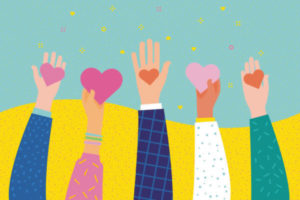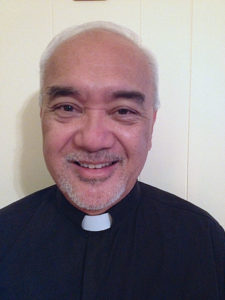Do I Care, Advocate, Act On Behalf of the Poor and Marginalized?
The Rev. John A.H. Tomoso†
In my reading of the Holy Gospels, it is clear to me we are to advocate for the poor and the marginalized around us, caring for their needs and pursuing justice, even social justice, on their behalf. It is clear to me we are not to neglect spiritual needs for social ones nor social needs for those that are spiritual. These two areas of need are not in opposition. Christ, Himself, demonstrated care for the whole person, body and spirit. As a Priest, I say unequivocally we must demonstrate the same, not allowing anything for an excuse to keep us from addressing the spiritual and social needs of our community. Not only do we need to address them but we must also work to mitigate, improve and meet these needs. None of us, however, can do it alone.
So, let us ask these questions. Do you have a relationship with someone who is “poor,” either spiritually or socially? If so, how are you involved with him or her, to help them overcome their situation? In Matthew 35:40, Jesus says: “I tell you, whenever you did this for one of the least important of these brothers of mine, you did it for me!” (Good News Bible) When looking at how our government and non-government organizations work in our community, perhaps a good question to ask is “Do I try to understand the plight of the poor and those who are ‘marginalized’ or made to stay on the outside as if they don’t matter?” Another question is: “How does our tax money and charitable-giving allow the work of caring for those who have or are heard less to continue and get done?” In Proverbs 31:8-9, the advice is given “Speak up for people who cannot speak for themselves. Protect the rights of all who are helpless. Speak for them and be a righteous judge. Protect the rights of the poor and needy.” (Good News Bible) Think of this the next time someone, who is running for office, asks for your support.

There are those who are poor in our community. I know that the number of homeless in and around us is on the increase. There are many needy families, especially children who are perhaps living a paycheck away from being homeless. Are you generous to these folk, some of whom may be members of our own family? What about those who are poor in spirit? How can we be generous to them, sharing with them, from the depths of our heart and soul, the generosity of God, who is all around us and lives within us. In the Letter of James 1:27, one of the practical instructions reminds us that “What God the Father considers to be pure and genuine religion is this: to take care of orphans and widows in their suffering and to keep oneself from being corrupted by the world!” (Good News Bible) With this, we can better understand the plight of the poor and needy all around us. We can also better understand that within our own spirit and personhood, we can be poor, needy and marginalized. From our own poverty, spiritual and economic, can come a solution.
In the pages of Fil-Am Voice are stories and even questions about those in our community who need care. Taken together, the quotes of Holy Scripture that I have cited, come down to this question: How well are you caring for yourself, by caring for others, in order to be the person God wants you to be? Who is My Neighbor? In Luke 10:29, the exact question was asked of Jesus. Our Lord answered the question with the story of the Good Samaritan. We all know this story. Within it are answers to how we are to care and advocate and act. Within this story are the building blocks to how we live and how our community, you and I, are members who care, who advocate and who help. But Kababayan, isn’t this who we are, anyway, as Filipinos?
 Rev. John A. Hau’oli Tomoso† is a Social Worker and Episcopal Priest. He is a Priest Associate at Good Shepherd Episcopal Church in Wailuku and an on-call Chaplain at Maui Memorial Medical Center. Tomoso was graduated from St. Anthony Jr./Sr. High School, the College of St. Thomas in St. Paul, Minnesota (Bachelor of Arts in Political Science and Sociology) and Myron B. Thompson School of Social Work at the University of Hawai’i at Mānoa (Masters of Social Work). In 2008, he retired from the civil service as the Maui County Executive on Aging. In March 2019, Tomoso retired as the Executive Director of the non-profit Tri-Isle Resource Conservation and Development Council, Inc., after a social work career that spanned 43 years of practice. His wife Susan recently retired as a 7th grade Language Arts Teacher at Maui Waena Intermediate School.
Rev. John A. Hau’oli Tomoso† is a Social Worker and Episcopal Priest. He is a Priest Associate at Good Shepherd Episcopal Church in Wailuku and an on-call Chaplain at Maui Memorial Medical Center. Tomoso was graduated from St. Anthony Jr./Sr. High School, the College of St. Thomas in St. Paul, Minnesota (Bachelor of Arts in Political Science and Sociology) and Myron B. Thompson School of Social Work at the University of Hawai’i at Mānoa (Masters of Social Work). In 2008, he retired from the civil service as the Maui County Executive on Aging. In March 2019, Tomoso retired as the Executive Director of the non-profit Tri-Isle Resource Conservation and Development Council, Inc., after a social work career that spanned 43 years of practice. His wife Susan recently retired as a 7th grade Language Arts Teacher at Maui Waena Intermediate School.
